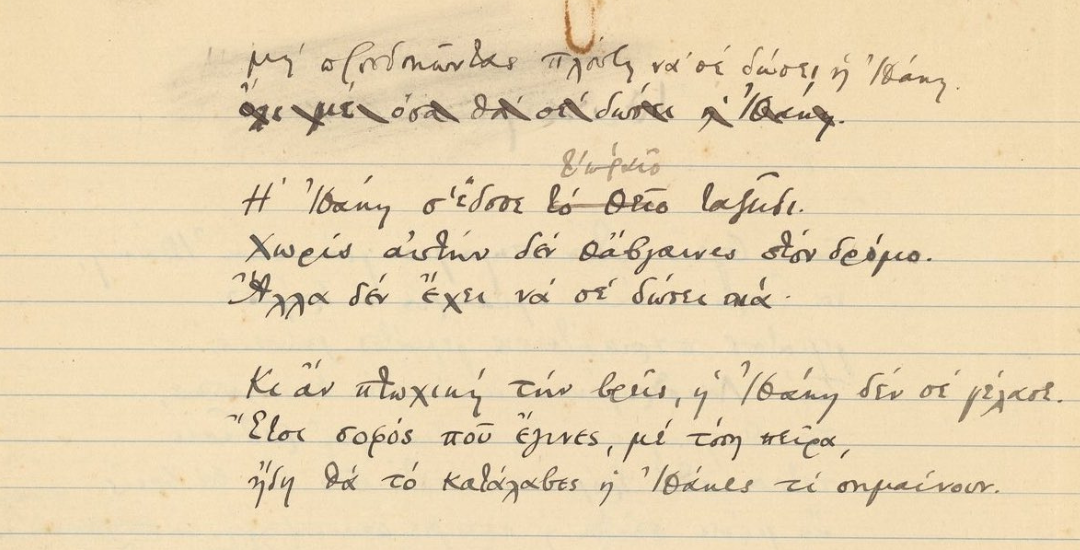


There are pieces of art and literature that stay with us, quietly shaping the way we see the world. For me, that piece is “Ithaka” by C.P. Cavafy. This timeless poem, originally written in Greek, and now translated to English (and other languages) speaks to the soul of every dreamer, adventurer, and seeker of purpose. Its words have anchored me through various stages of life, reminding me to treasure the journey rather than fixate on the destination.
Σα βγεις στον πηγαιμό για την Ιθάκη,
να εύχεσαι νάναι μακρύς ο δρόμος,
γεμάτος περιπέτειες, γεμάτος γνώσεις.
Τους Λαιστρυγόνας και τους Κύκλωπας,
τον θυμωμένο Ποσειδώνα μη φοβάσαι,
τέτοια στον δρόμο σου ποτέ σου δεν θα βρεις,
αν μέν’ η σκέψις σου υψηλή, αν εκλεκτή
συγκίνησις το πνεύμα και το σώμα σου αγγίζει.
Τους Λαιστρυγόνας και τους Κύκλωπας,
τον άγριο Ποσειδώνα δεν θα συναντήσεις,
αν δεν τους κουβανείς μες στην ψυχή σου,
αν η ψυχή σου δεν τους στήνει εμπρός σου.
Να εύχεσαι νάναι μακρύς ο δρόμος.
Πολλά τα καλοκαιρινά πρωιά να είναι
που με τι ευχαρίστησι, με τι χαρά
θα μπαίνεις σε λιμένας πρωτοειδωμένους·
να σταματήσεις σ’ εμπορεία Φοινικικά,
και τες καλές πραγμάτειες ν’ αποκτήσεις,
σεντέφια και κοράλλια, κεχριμπάρια κ’ έβενους,
και ηδονικά μυρωδικά κάθε λογής,
όσο μπορείς πιο άφθονα ηδονικά μυρωδικά·
σε πόλεις Aιγυπτιακές πολλές να πας,
να μάθεις και να μάθεις απ’ τους σπουδασμένους.
Πάντα στον νου σου νάχεις την Ιθάκη.
Το φθάσιμον εκεί είν’ ο προορισμός σου.
Aλλά μη βιάζεις το ταξείδι διόλου.
Καλλίτερα χρόνια πολλά να διαρκέσει·
και γέρος πια ν’ αράξεις στο νησί,
πλούσιος με όσα κέρδισες στον δρόμο,
μη προσδοκώντας πλούτη να σε δώσει η Ιθάκη.
Η Ιθάκη σ’ έδωσε τ’ ωραίο ταξείδι.
Χωρίς αυτήν δεν θάβγαινες στον δρόμο.
Άλλα δεν έχει να σε δώσει πια.
Κι αν πτωχική την βρεις, η Ιθάκη δεν σε γέλασε.
Έτσι σοφός που έγινες, με τόση πείρα,
ήδη θα το κατάλαβες η Ιθάκες τι σημαίνουν.
| Uploaded by | P. T. |
| Source of the quotation | http://www.kavafis.gr |
As you set out for Ithaka
hope the voyage is a long one,
full of adventure, full of discovery.
Laistrygonians and Cyclops,
angry Poseidon—don’t be afraid of them:
you’ll never find things like that on your way
as long as you keep your thoughts raised high,
as long as a rare excitement
stirs your spirit and your body.
Laistrygonians and Cyclops,
wild Poseidon—you won’t encounter them
unless you bring them along inside your soul,
unless your soul sets them up in front of you.
Hope the voyage is a long one.
May there be many a summer morning when,
with what pleasure, what joy,
you come into harbors seen for the first time;
may you stop at Phoenician trading stations
to buy fine things,
mother of pearl and coral, amber and ebony,
sensual perfume of every kind—
as many sensual perfumes as you can;
and may you visit many Egyptian cities
to gather stores of knowledge from their scholars.
Keep Ithaka always in your mind.
Arriving there is what you are destined for.
But do not hurry the journey at all.
Better if it lasts for years,
so you are old by the time you reach the island,
wealthy with all you have gained on the way,
not expecting Ithaka to make you rich.
Ithaka gave you the marvelous journey.
Without her you would not have set out.
She has nothing left to give you now.
And if you find her poor, Ithaka won’t have fooled you.
Wise as you will have become, so full of experience,
you will have understood by then what these Ithakas mean.
Sherrard, Philip; Keeley, Edmund
| Uploaded by | P. T. |
| Source of the quotation | http://www.cavafy.com |
“Ithaka” draws from the myth of Odysseus, who embarks on a long voyage back to his homeland of Ithaca. But beyond its reference to Greek mythology, the poem serves as a metaphor for life’s experiences, ambitions, and personal growth. Cavafy’s words remind us that the richness of our lives is not measured by how quickly or efficiently we reach our goals, but by the adventures, wisdom, and memories we gather along the way.
The poem begins with a powerful invitation:
“As you set out for Ithaka, hope the voyage is a long one, full of adventure, full of discovery.”
These lines have been my mantra during moments of doubt and uncertainty. In times when the path ahead felt too long or difficult, I turned to Cavafy’s vision. His encouragement to embrace every twist and turn shifted my perspective on challenges. Rather than viewing obstacles as setbacks, I began to see them as essential chapters of my story.
One of the most inspiring aspects of “Ithaka” is its emphasis on personal transformation. The journey enriches us in ways we could not have foreseen at the outset. As the poem reminds us:
“Laistrygonians and Cyclops, angry Poseidon—don’t be afraid of them… you won’t meet them unless you bring them along inside your soul.”
This line resonates deeply with me. It highlights the idea that many of the fears and barriers we face are born from within. It’s a reminder to approach life with courage, curiosity, and an open heart, for the monsters we imagine are often reflections of our own doubts and anxieties.
Reflecting on my journey—from my education and professional career to my personal growth—I realize that “Ithaka” has subtly shaped my values. It has taught me to savor each step, celebrate small victories, and view the unknown with excitement rather than fear. As I build new ventures, pursue creative projects, and navigate life’s complexities, I remind myself that the joy lies in the process.
I believe we all have our own Ithacas—those distant dreams or goals that propel us forward. But as Cavafy so beautifully reminds us, the destination itself may not hold all the answers. It’s the journey, the experiences, and the evolution of who we become along the way that truly matters.